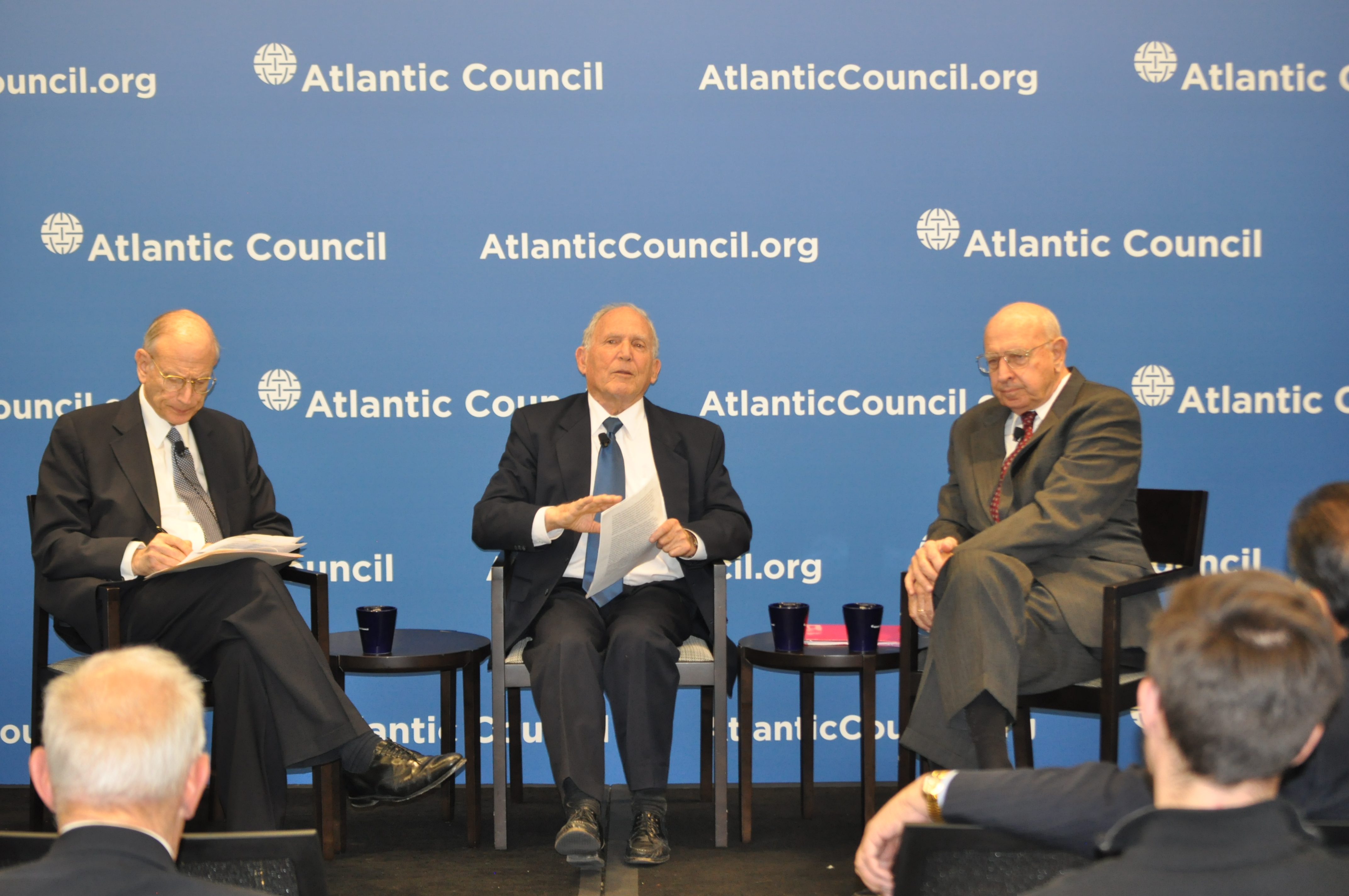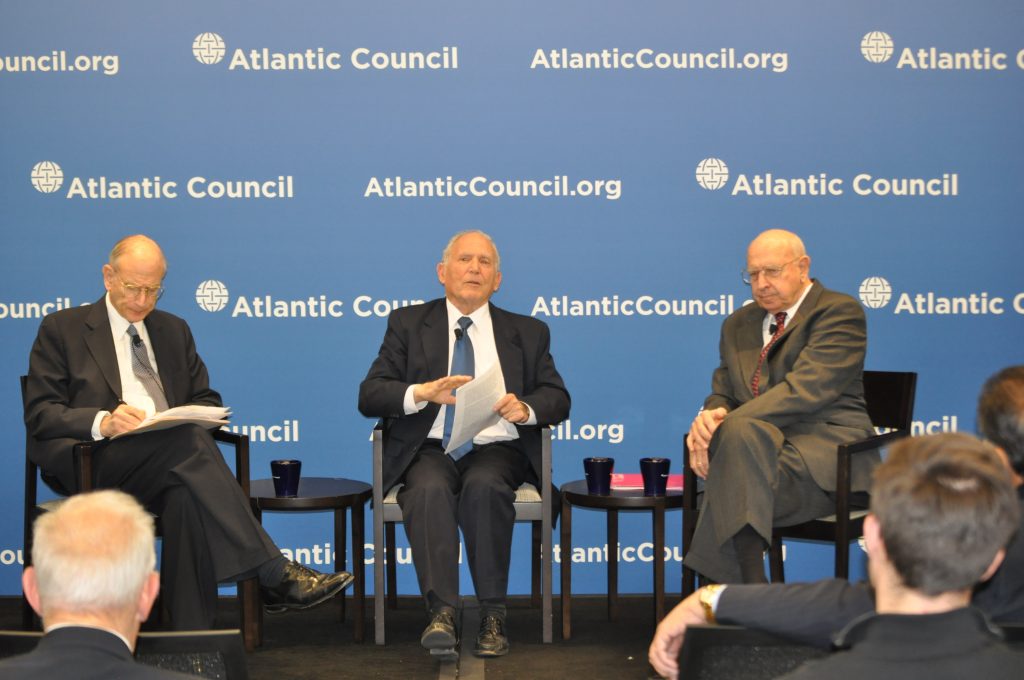
Deadline in Talks Likely to Be Extended, Says Former US Ambassador Thomas Pickering
As international negotiators approach next week’s self-imposed deadline for reaching a compromise to let Iran pursue a nuclear program, US and French former officials told Atlantic Council forums this week that a deal could offer new advantages in the Middle East.
An agreement could create an opportunity for a US-Iranian “open relationship” on confronting militant threats in Iraq and Afghanistan, Ambassador Thomas Pickering told a November 19 forum at the Council in Washington. “For the first time, the United States and Iran have gotten down to the wire, along with our European and Russian and Chinese colleagues, to something that could in one way or another generate, if not a sea change, certainly a major shift in the situation in the region,” said Pickering, a former undersecretary of state for political affairs.
At an Atlantic Council conference in Istanbul, former French Ambassador Jean-David Levitte suggested that the six countries negotiating a nuclear accord should use a successful deal to convene a meeting with Iran, Turkey, Saudi Arabia, and the Gulf Cooperation Council to discuss a common strategy against the growth of ISIS (the Islamic State of Iraq and al-Sham). Levitte is a senior policy advisor at a Washington-based consultancy, Rock Creek Global Advisors.
“Getting the Iranian nuclear problem behind us with the kind of certainty about monitoring and, obviously verification, is the critical factor now. If that can be done, then one sees further possibilities down the road,” and cooperation on Iraq and Afghanistan may be at the top of the list, said Pickering. He serves on the board of The Iran Project, which seeks better ties between the US and Iran.
US-Iranian Possibilities, Israeli Concerns
The United States and Iran share concerns about the spread of Sunni militant groups in Iraq, Syria, and Afghanistan. The Obama administration is leading a coalition in conducting airstrikes against Sunni fighters of ISIS (the Islamic State of Iraq and al-Sham) who have seized large swathes of Iraq and Syria. Iran supports Shia militias that view ISIS as a foe.
“We would like to know what the [Iranian] Revolutionary Guard is doing in terms of planning Shia operations in northern Iraq as we train Shia and plan Shia operations in northern Iraq,” Pickering said, describing one possible area of cooperation between Washington and Tehran.
The prospect of US cooperation with Iran against ISIS does not sit well with Israeli Prime Minister Benjamin Netanyahu. “Iran is not your ally. Iran is not your friend. Iran is your enemy. It’s not your partner. Iran is committed to the destruction of Israel,” Netanyahu said this week on CBS’ “Face the Nation.”
Eizenstat: What Alternative to a Deal?
As the negotiating sides’ self-imposed November 24 deadline looms, the Iran nuclear talks are seeking common ground on Iran’s demand to be allowed to enrich uranium, and on how much and when the international community might ease its sanctions on the Iranian economy.
In the panel discussion, Ambassador Stuart Eizenstat, chairman of the Atlantic Council’s Iran Task Force, said the talks will have significant implications on:
1) The future of the nonproliferation agreement;
2) A nuclear arms race in Iran’s neighborhood;
3) The US-Israeli relationship, “because any deal that is reached is likely to be considerably less than what the Israeli government has established as a red line, which is: no enriched uranium”;
4) President Barack Obama’s relationship with Congress, “because the new majority is likely to criticize any agreement that falls short of what the Israeli government considers acceptable”;
5) The balance of power in the Middle East.
There are “huge advantages to the United States, the West, and to Israel in having an agreement along the lines of what we see emerging,” Eizenstat said. “Without an agreement one has to always ask: What is the alternative?”
“No deal means an unrestrained use of centrifuges [to enrich uranium, potentially to weapons grade], it means the continuation of [the] uranium-plutonium plant in Arak, it means no intrusive inspections by the IAEA, it means no elimination of 20-percent enriched uranium, it means less likelihood of eliminating weaponization, it means undercutting those more relative moderates in Iran. So there are enormous implications,” he added. Iran’s nuclear reactor at Arak would use uranium fuel that, when spent, could be re-processed to produce plutonium, an alternative to highly enriched uranium as the core of nuclear bombs.
Gen. Uzi Eilam: Limit Enriched Uranium
Obama administration officials say they are hopeful of reaching a deal by November 24 and are not discussing an extension of that deadline. The conversations with the Iranians have been “tough, direct, and serious,” a senior Obama administration official told reporters in a background briefing this week.
Brig. Gen. Uzi Eilam, a senior research fellow at the Institute for National Security Studies in Tel Aviv and former director general of the Israeli Atomic Energy Commission, told the audience at the Atlantic Council that any agreement with Iran should:
1) Ensure that Iran is at least one year away from having enough enriched uranium to build a bomb;
2) Be in force for ten years;
3) Not lift all sanctions on Iran, but at least take some steps that will boost moderate Iranians.
Acknowledging that some Israelis have concerns about a nuclear deal with Iran, Eilam said, “I am much more optimistic than my colleagues in Israel, but I think that I am right!”
Netanyahu, in particular, has warned against a nuclear deal that allows Iran to continue enriching uranium.
Kroenig: ‘Near-Nuclear’ Risks
Besides Israel, Saudi Arabia and Iran’s other Arab rivals in the Persian Gulf region are anxious about a deal that lets Iran keep a nuclear program.
Matthew Kroenig, an Atlantic Council nonresident senior fellow, argues in “Mitigating the Security Risks Posed by a Near-Nuclear Iran” that a “latent nuclear Iran would pose a nuclear proliferation threat even if it does not itself build nuclear weapons.”
“It could transfer sensitive nuclear technology to other states, set off a nuclear arms race in the region, and weaken the global nonproliferation regime,” writes Kroenig, who is with the Council’s Brent Scowcroft Center on International Security.
What happens if no agreement is reached on November 24?
“The world doesn’t stop spinning … and the sun rises the next morning,” said Pickering.
Being self-imposed, the deadline is in some ways “a self-created jamming of both sides to try to get this thing done. This, in my view, means that there is intent here and it is realistic,” Pickering said. He suggested that a postponement of the deadline is more likely scenario on November 24 than is a deal or a breakdown of the negotiating process.
Eizenstat agreed.
“I think we’ve all been in negotiations enough to know that when you get to a certain point, a certain momentum, both sides end up wanting to have a success; it may not be on the twenty-fourth,” Eizenstat said.
Ashish Kumar Sen is an editor at the Atlantic Council.
Image: Former top US officials—Ambassadors Stuart Eizenstadt, left, and Thomas Pickering, right—join Israel’s retired Brigadier General Uzi Eilam, center, in a discussion of the prospects for an agreement to let Iran develop its nuclear program. Amid the challenges and risks of reaching a deal, Eizenstadt described “huge advantages to the United States, the West, and to Israel in having an agreement along the lines of what we see emerging.” (Atlantic Council photo)
